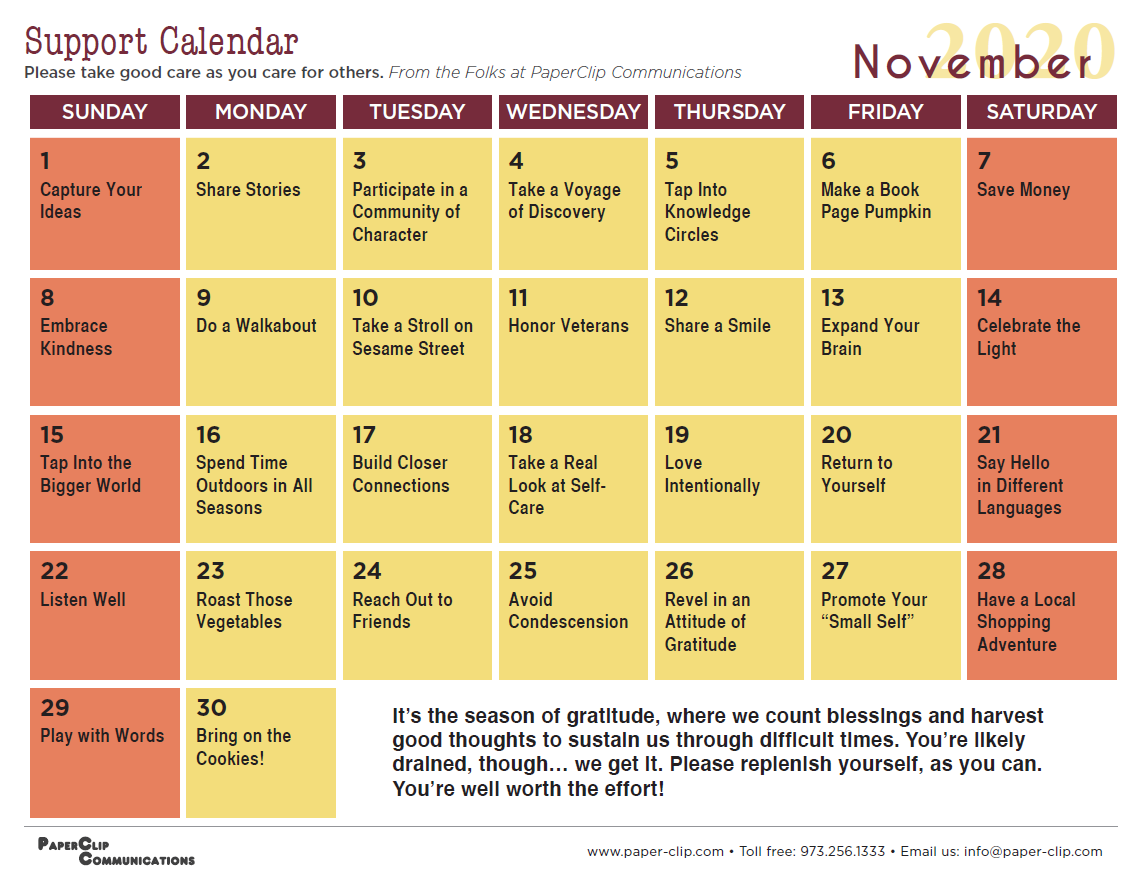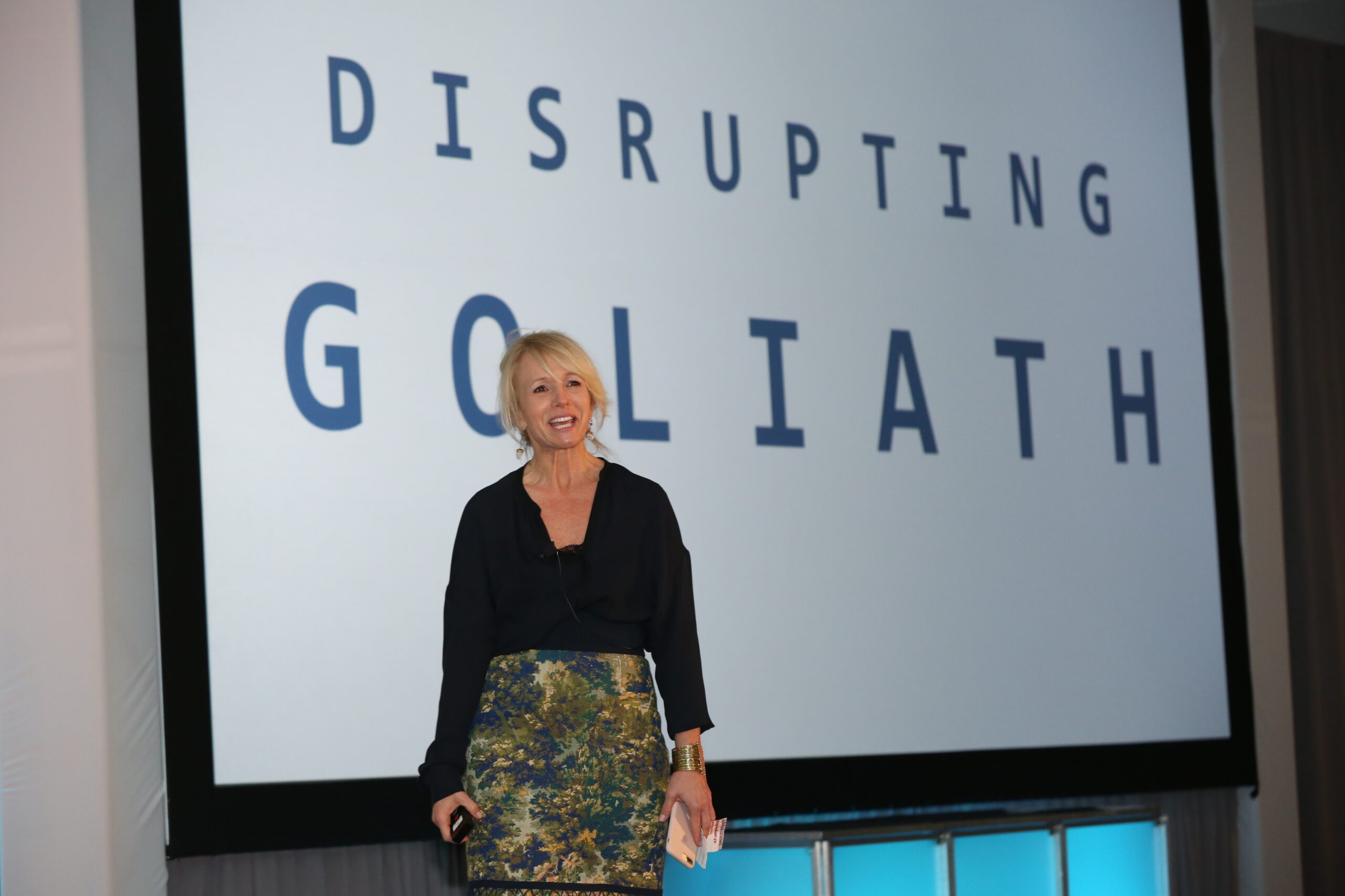 Participate in a Community of Character. Honor Veterans. Reach Out to Friends. Take a Real Look at Self-Care. These are just four of the month of constructive suggestions provided by long-time SIPA member PaperClip Communications to their audience of “hard-working campus professionals” in their November Support Calendar.
Participate in a Community of Character. Honor Veterans. Reach Out to Friends. Take a Real Look at Self-Care. These are just four of the month of constructive suggestions provided by long-time SIPA member PaperClip Communications to their audience of “hard-working campus professionals” in their November Support Calendar.
Each item on this wonderful calendar—located on their Free Resources page—links to follow-up ideas, tutorials and resources. “PaperClip Communications knows how difficult and uncertain this time is, and we’re happy to offer these complimentary resources [their bold] to help our colleagues during this crisis,” they write on the homepage.
Back in March and early April, many organizations moved quickly to build COVID-19 microsites to accompany their regular website. While many of those produced huge bumps in traffic, they also created a new vibe—we care about you, your health and how you are coping. Stephanie Williford of SIPA member EB Medicine has talked about the pushback she got when their COVID site first appeared behind a paywall. They quickly moved it in front.
These are emotional lifts at a time when we all still need it most. It’s also smart business. A new report from global B2B marketing agency Stein IAS, In Search for the Emotionally-Qualified Lead (EQL), seconds the notion that emotion-charged marketing remains very important in B2B buying decisions.
“In an age of purpose and now a time of crisis, human emotion is front and center,” Reuben Webb, chief creative officer at Stein IAS, told MarTech Series (MTS). “This is a B2B revolution that’s been building for some time. In embracing digital marketing and marketing technology, many B2B marketers, have placed over-emphasis on such measures as Marketing-Qualified Leads (MQL) and Sales-Qualified Leads (SQL). At Stein IAS, our view is that another measure—the EQL—may be the most meaningful measure of all.”
Of course, it’s not just B2B. A quick look at Chesapeake Family’s homepage shows emotional connections through photos of families, kids trying to learn at home, and even a penguin. It’s just that B2B heartstrings are a little more of a surprise. According to MTS, a major study by Google and Gartner indicates that, while the average B2C brand has an emotional connection with between 10% and 40% of consumers; seven out of nine B2B brands have emotional connections with more than 50% of their customers.
Two years ago, at a SIPA Annual Conference, Rick Wilkes, OPIS director of marketing, talked about the importance of emotion in marketing.
“I think emotion is underrated in any kind of marketing, particularly with websites,” he said. “On the new OPIS site you see a refinery at sunset, and that’s the best a refinery is ever going to look. You’d be amazed in stock photography how many fuel places are within sunsets. It’s very soothing. So it’s a big bold image [and the words,] ‘Buy & sell oil & gas products with CONFIDENCE’—and the confidence is the emotional hook there.”
OPIS has had that up for a while so it’s obviously working—including the words, “OPIS delivers pricing and analysis you can trust…” “A successful brand is based on a connection that includes trust and an emotional bond which fosters a long-term relationship,” said Nick Hague, head of growth at B2B International. Indeed, with Harvard Professor Gerald Zaltman finding that a whopping 95% of all purchase decisions are made subconsciously, it’s clear that B2B brands cannot afford to forget the importance of emotion.”
“The best marketing doesn’t feel like marketing,” said the famous “Marketoonist” Tom Fishburne, quoted on the site Instapage. They write: “Does it feel like marketing when you watch a poignant advertisement and connect emotionally with the subject? Does it feel like marketing when you read a genuine positive customer review of a kind waitstaff and great service?
“Emotional connections happen because we’re human, and we’re built for these connections, wired for them, and rely on them to live a rich, meaningful life. Despite our significant advances in science and technology, human emotion (mainly our subconscious) will always be core to our DNA. Marketing by appealing to raw and genuine human emotion is essential, smart, and pays off.”



 Participate in a Community of Character. Honor Veterans. Reach Out to Friends. Take a Real Look at Self-Care. These are just four of the month of constructive suggestions provided by long-time SIPA member PaperClip Communications to their audience of “hard-working campus professionals” in their November
Participate in a Community of Character. Honor Veterans. Reach Out to Friends. Take a Real Look at Self-Care. These are just four of the month of constructive suggestions provided by long-time SIPA member PaperClip Communications to their audience of “hard-working campus professionals” in their November 


 Elizabeth Green (pictured), CEO of Brief Media—a leading publisher in the veterinary medicine field—once delivered a dynamic keynote at BIMS titled
Elizabeth Green (pictured), CEO of Brief Media—a leading publisher in the veterinary medicine field—once delivered a dynamic keynote at BIMS titled 

